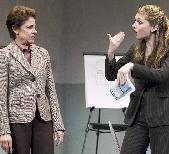SEARCH
REVIEWS
FEATURES
NEWS
Etcetera and
Short Term Listings
LISTINGS
Broadway
Off-Broadway
BOOKS and CDs
OTHER PLACES
Berkshires
London
LA/San Diego
Philadelphia
Elsewhere
QUOTES
On TKTS
LETTERS TO EDITOR
FILM
LINKS
MISCELLANEOUS
Free Updates
Masthead
Writing for us
A CurtainUp Review
Open Window
by David Avery
|
How can a twenty-four year old assess an emotional state? Twenty-four years old is an emotional state! ---Rachel to Susan, arguing over what's best for Cal. |

Linda Bove (L) and Shoshanna Stern (R) in Open Window
|
To start, the play involves the attempts of two women to break through the apparently insurmountable wall around a young man who has allegedly strangled his father. The defendant in question has been locked up in a dark basement for most of his life and chained to the wall by his leg. He is deaf, and seemingly has no language skills whatsoever. Rachel (Linda Bove) is a linguist trying desperately to prove he can learn a language so that he can stand trial. Susan (Shoshannah Stern) is a young psychologist with the National Institute for Mental Health (NIMH), who thinks he should be judged incompetent and taken to a place where he can be cared for.
The meat of the play is devoted to the struggle between these two women in Chris Barcerra's grim and bare state hospital setting. Rachel is a world renown leader in her field, a strong brook-no-nonsense personality who has lately dropped mysteriously out of the limelight. Susan who's young and at the start of her career wishes to impress Rachel but without losing her perspective on the situation.
And now for that something off: While the two women argue over life, death, and the nature of mankind, the accused sits in the corner unnoticed. It rings a bit false that these two, for the most part ignore the disabled young man in dire straits since both the characters (and the actors playing them) are hearing impaired. They should have more empathy with him, yet come across as slightly oblivious to anything but there own need to impress each other. The entire play is performed in American Sign Language, though that is not the point of the play. Though Rachel and Susan do discuss the fact that they are hearing impaired, it is not the centerpiece of the play but more like a character quirk and after a while it's hardly noticed.
The play overall presents a captivating foray into the nature of communication, language, and how the two define us as human beings. What is language, how does it define us, are we still human without it? It emphasizes these questions by providing voice translations for the audience of the ASL using actors on a catwalk above the action. As the play progresses, even non-ASL speaking people can see that what is being said and what is being signed aren't quite the same. It's much like watching a foreign movie with subtitles -- somehow you know what is being said probably has more meaning in the original language. Special note should be given to Jacqueline Schultz and Erin Bennett as the voices of Rachel and Susan, respectively. They have the difficult task of not only translating the words, but encompassing the feeling and tone of the words to match the expression and body language of the principals.
Bove gives a brilliant portrayal of an emotionally handicapped woman. Her hardened, no-nonsense exterior and clinical detachment hide a truly broken person. She clings desperately to work for sanity, and there is some sense that if she fails at helping her patient, she has failed at her life. Stern's Susan is just as vulnerable, yet she doesn't flee from the challenges that Rachel presents to her. Though her motives are perhaps not as pure as first imagined, you sense that she is probably more stable and more aware of the boy's needs than Rachel. After all, if Rachel succeeds in teaching Cal the basics of language, he will stand trial. Yet is it freedom to merely avoid the consequences of your actions through incompetence? If he goes with Susan to the NIMH center, he'll be just as much a prisoner.
The playwright uses some pretty broad strokes to highlight its points. The young man in jeopardy has no name, so Susan names him "Cal." The play then immediately references The Tempest (Caliban was a disfigured creature in the employ of Prospero), and then, in case you missed it, quotes from the play between scenes. A pastoral sojourn into the hospital's outside garden (courtesy of Peter Maradudin's lighting effects) to demonstrate the contrast between Rachel and Susan's approaches to helping Cal is a bit overdone. It also seems unlikely that an alleged killer with absolutely no socialization and a proclivity for fondling himself would be allowed out of a locked room without handcuffs, shackles and a guard.
Despite some bogging down in the tempo with the back story of Rachel's painful past, Open Window holds our interest through its strong acting and intriguing central concept.
| OPEN WINDOW Playwright: Stephen Sachs Director: Eric Simonson Cast: Linda Bove (Rachel), Erin Bennett (Woman #2/Voice of Susan), Kyle Colerider-Krugh (Man), Chris B. Corrigan (Cal), Jacqueline Schultz (Woman #1/Voice of Rachel), Michael Adam Soudakoff (Boy), Shoshannah Stern (Susan) Set Design: Chris Barreca Lighting Design: Peter Maradudin Costume Design: Myung Hee Cho Sound Design: Lindsay Jones Running Time: approximately 1 hour, 20 minutes, no intermission Dates: From October 14 - November 20, 2005 Tues. through Fri. @ 8, Sat. @ 5 and 9, Sun. @ 2 and 7 Pasadena Playhouse, 39 South El Molino Avenue Pasadena, CA 91101 (626) 356-7529 www.pasadenaplayhouse.org Tickets: $37 and $42 Evenings, Sat. matinee $48, Sun. matinee $53 Reviewed by David Avery on 10/23/05. |

Leonard Maltin's 2006 Movie Guide

Leonard Maltin's Classic Movie Guide

>6, 500 Comparative Phrases including 800 Shakespearean Metaphors by our editor.
Click image to buy.
Go here for details and larger image.




